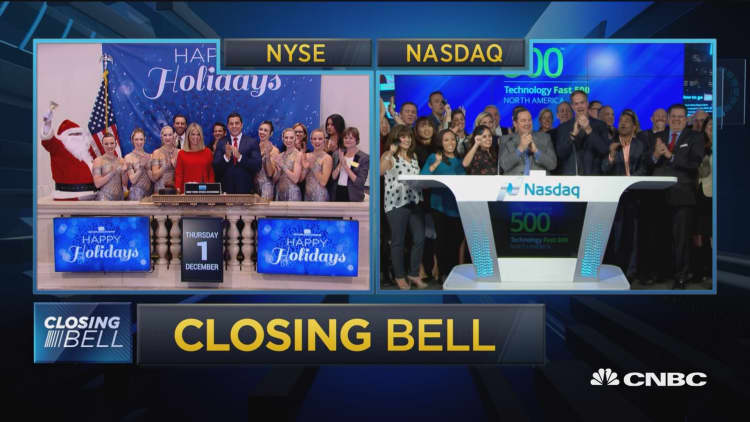
Corporate tax cuts: How big an impact on corporate profits?
I've written often that the markets are expensive, and the reason they are expensive is that traders have levitated themselves into believing that earnings are going to expand in 2017 due to a vague combination of tax cuts, infrastructure spending and lower regulations.
It's a powerful combination, but there's not much flesh on the bones. Today Michael Thompson, president and chairman of Standard & Poor's Investment Advisory Services, and his team made a stab at estimating the impact on earnings from corporate tax cuts.
Their conclusion: The impact could be significant. But there's a lot of "ifs."
Why focus on corporate tax cuts? Because it's the only thing in the "Trump rally" that has any kind of plausible numbers associated with it.
President-elect Trump's proposed nominee for U.S. Treasury secretary, Steve Mnunchin, said on our air yesterday that the administration was still targeting a reduction in the corporate tax rate from 35 percent to 15 percent.
The current 2017 estimate for the entire S&P 500 is roughly $131 per share. Thompson estimates that every 1 percentage point reduction in the corporate tax rate could "hypothetically" add $1.31 to 2017 earnings.
So do the math: If there is a full 20 percentage point reduction in the tax rate (from 35 percent to 15 percent), that's $1.31 x 20 = $26.20.
That implies an increase in earnings of close to 20 percent, or $157.
What does that mean for stock prices? The S&P is currently trading at a multiple (PE ratio) of 17, high by historical standards. Applying that 17 multiple to earnings of $157, we get a price on the S&P 500 of roughly 2,669 for 2017.
That is 469 points or roughly 20 percent above where it is today.
That's a lot.
Here's the problem, and why Thompson wisely referred to his calculations as "hypothetical":
1) It's unlikely that all the tax savings will go straight to the bottom line. The money can be used for other purposes. The obvious alternative choice is capital expenditures — investing in equipment. The money could also be used for mergers and acquisitions. Or buybacks.
2) The tax code is very complicated. Most corporations don't pay 35 percent. Thompson notes the effective tax rate is closer to 29 percent. Some pay far less. Some have very aggressive tax efficiency (or tax avoidance) strategies. So if the effective rate goes to 15 percent, will those who pay far less pay even less? Will we have some companies end up paying, say, 3 percent?
No one knows, at least not yet. There will likely be some minimum required. And this was supposed to be done in conjunction with the closing of some loopholes.
You get the point: It's not clear we are going to get a cut of this magnitude, and a cut is not all going to go to the bottom line.
Thompson freely acknowledges this, but insists the impact is still significant: "The truth is somewhere in the middle, but no matter what there will be some kind of earnings boost from a tax cut," he told me.
Does this mean the market is going to keep going straight up? Thompson is staying clear of any claims: He and his teams are "not suggesting that the stock market is about to immediately experience gains that come anywhere near the hypothetical examples just presented, we only mean to illustrate the potential significance that the discussion surrounding corporate tax reform could have on investor psychology and the level of 'animal spirits' within the broad economy and financial markets generally."
It's still pretty vague, but at least we are putting some flesh on the bones.



